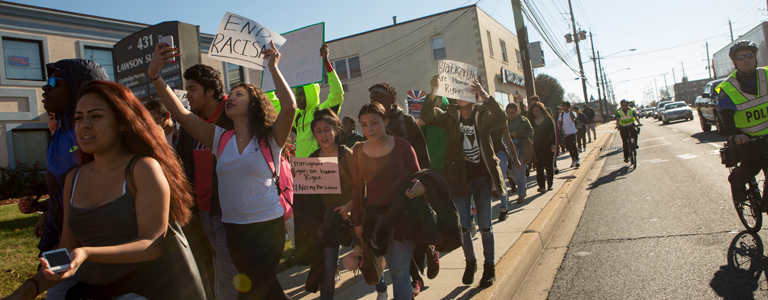Many adults are hesitant to discuss issues related to race with their children — but shielding kids from these conversations isn’t helpful. Facilitating dialogue early in life can help them overcome stress from racial discrimination and create a better understanding of power and privilege. Here, we’ll take a brief look at the current state of racism in our country, how children are impacted, and how adults can create an open dialogue to support them.
Racism in the U.S.
According to the Pew Research Center, the number of Americans who view racism as a major issue in our country is trending up sharply. In its most recent survey, Pew found that:
● 58 percent of Americans say racism is a “big problem in our society”
● 29 percent say it’s “somewhat of a problem”
● 12 percent say racism in the United States is a “small problem or not a problem”
Those numbers are rising rapidly. Just two years ago 50 percent of Americans viewed racism as a “major problem” for society — but in 2011, only 28 percent reported feeling that way.
How Children Are Impacted
With such views increasingly prevalent in our society, it stands to reason that children may experience a significant impact. Unfortunately, many don’t have adults who are helping them deal with it constructively. In a recent post by Counseling@NYU, which offers an online masters in school counseling from NYU Steinhardt, Chris Avery, a former educator who now leads a nonprofit for underserved students, says, “The attitude of many schools is that race is a political issue that should be checked at the door.”
But for many children, the stakes are high. A recent study indicated that stress from racial discrimination influences the persistent gaps in academic performance between some white and non-white students.
Additional research supports the emotional and physical impact on kids:
● Children who experience racism appear to be at higher risk of anxiety and depression.
● Their parents report that they tend to have poorer health overall.
● The inability to create social bonds in racially-charged communities can have a negative impact on health.
How Adults Can Help
Both educators and parents can help to facilitate conversations about race — and should work together to create an open dialogue for kids on the subject.
Veronica Pichardo, school counselor chairperson at City Polytechnic High School in Brooklyn, N.Y., and an adjunct professor at Counseling@NYU, says there’s not enough freedom to talk about race and racism in class. “I don’t think that my job is to change what you think,” she said. “My job is to raise awareness of what’s going on and just create an environment where we can talk.” Pichardo says the key is to create a safe space where kids can “just dive deep and flesh out these feelings that they have or these assumptions that they have” without feeling judged.
Parents can follow suit by creating a balance of cultural pride while teaching their children to respect those with different backgrounds. Quoted in an article for Smithsonian, pediatrician and researcher Ashaunta Anderson says that studies have shown that “minority children have reduced levels of anxiety when their parents reaffirm pride in their cultural background.” She recommends that parents engage in activities that reinforce this approach with their kids, while avoiding behaviors that promote mistrust of people of other races.
These conversations are essential, because racism and discrimination are an obstacle for success. However, when we teach kids how to embrace an open dialogue about these topics, we can help future generations be better prepared to overcome some of the life challenges that are linked to race and racism.


